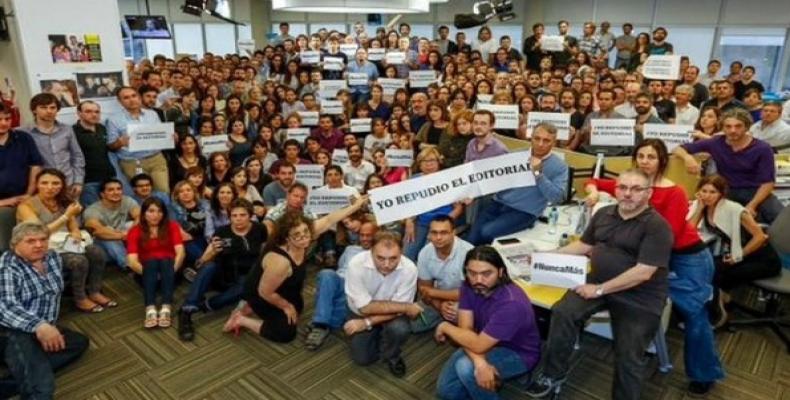Buenos Aires, November 24 (teleSUR-RHC)-- Journalists reacted strongly and swiftly Monday to an editorial published by the Argentinean La Nación newspaper that called for the newly elected government of Mauricio Macri to cease the prosecution of perpetrators of human rights abusers during the country's dictatorship.
"The election of a new government is a propitious moment to end the lies about the seventies," read the controversial editorial, published the morning following Macri's victory over his leftist rival in the presidential election.
Macri defeated Daniel Scioli, who was representing the incumbent of the Front for Victory coalition.
The governments of the Front for Victory, first under the presidency of the late Nestor Kirchner and later under Cristina Fernandez, made a deliberate effort to address the crimes committed during the bloody Argentine dictatorship that ruled from 1976 to 1983.
The dictatorship engaged in in a Dirty War that forcibly disappeared up to 30,000 people. The polemical editorial claimed that the prosecution of those who committed human rights abuses itself constituted modern-day human rights abuses.
In a statement published on social media and approved by the Assembly of Workers at the paper, staff at La Nación reacted negatively to the editorial, saying that it “did not represent them in the slightest” and they they rejected the logic of the editorial that sought to equate efforts at securing justice with revenge.
A number of well-known journalists at the newspaper also distanced themselves from the editorial on their social media accounts. And journalists at La Nación were not alone in their repudiation.
Argentinean human rights activist and Nobel Peace Prize laureate Adolfo Perez Esquivel said the editorial was a “disgrace,” while the organization known as HIJOS, founded by the children of people forcibly disappeared by the dictatorship, said in response: “Our revenge is happiness.”
“If asking for justice means revenge (for La Nación), then they have distorted the concept of justice,” said Martin Fresneda, Argentinean secretary for human rights.
Fresneda added that the cases involving crimes against humanity had been conducted with “due process and the principles of legality.” Argentina's impunity laws, which protected the military junta and other human rights abusers, were repealed in 2003 by the National Congress, a decision that was held up by the Supreme Court in 2005.
A spokesperson from Macri's political party said that the president-elect had made clear he would continue to afford the judiciary the necessary independence to conduct its work, including the prosecution of human rights abusers.


